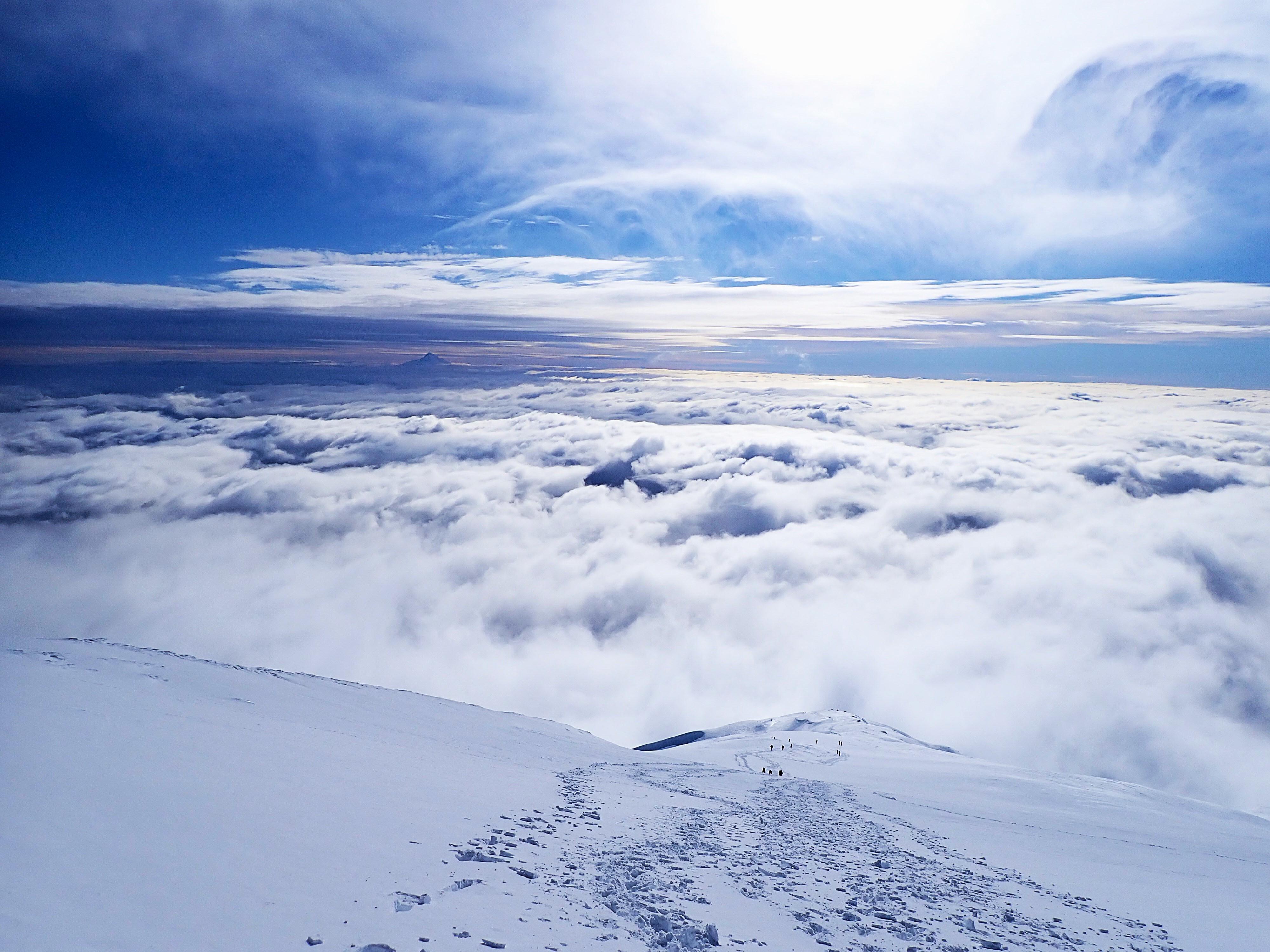We use cookies to improve your website experience. Essential cookies are required for the site to function properly, while analytics cookies help us understand how visitors use our site to make improvements. You can choose to accept all cookies or only the essential ones.

Current Conditions
Mount St. Helens Climbing Route
Safe backcountry travel requires preparation and planning. Current Condition information listed here is collected from on-site observations, multiple state and federal sources, and presented for recreational purposes. This is only one component in a spectrum of critical preparation and should be combined with current weather and avalanche forecasting at all elevations, advanced alpine education, fitness training, proper equipment and attire, and the "Ten Essentials." Mountain conditions are dynamic and can change rapidly without warning. Winter conditions can exist from October to July.
The user acknowledges that it is impossible to predict natural events in every instance accurately, and that the accuracy or reliability of the information provided here is not guaranteed. This report expires 24 hours after the posted time unless noted otherwise.
Last update: February 9, 2026
Marble Mountain Sno-Park: The road to Marble Mountain Sno-Park and parking lot are currently snow-free. Beware of potential ice on the road early in the day, there is a large pothole near the trailhead, and evidence of rockfall along the road just prior. Use caution, even when the road appears dry!
Climber's Bivouac: Climber's Bivouac is closed and gated for the season.
Summit Forecast:
- Monday 2/9: Cold temperatures (~16 F) with snow showers, clouds, and some fog expected. White out conditions may be present throughout the day. Winds gusting to 20 mph. Rain and snow mix at lower elevations. Avalanche Hazard Rating is Moderate (Yellow)
- Tuesday 2/10: Weather expected to turn sunny for mid-week, with winds to ~20 mph and a summit high temperature of 23* F. Avalanche Hazard Rating is Moderate (Yellow)
- Wednesday 2/11: Sunny conditions are expected to continue, with winds to ~15 mph, and a summit high temperature of ~23 F.
- Thursday 2/12: Expect sunshine with periods of fog, clouds and snow showers. Summit high of ~25* F with ~25 mph winds.
- Friday 2/13 into the weekend: Forecasts anticipate another winter storm moving in towards the end of the week bringing wind, snow, clouds and fog, and colder temperatures. Rain and snow mix expected at Marble Mountain Sno-Park.
CLIMBING ROUTE INFORMATION
Weekend storms have seen snow accumulation higher on the mountain, and likely ice at some altitudes. Lower on the route is still patchy and bare in spots.
EXERCISE EXTREME CAUTION AT THE RIM. The cornice is present and dangerous. Stay back - stay alive.
RECREATION INFORMATION
For information about:
- Climbing Mount St. Helens: Visit our climbing page.
- Winter recreation at Mount St. Helens: Plan your visit here.
- Winter Visitor Center Hours: Check out information about the north side of the volcano.
MSHI GUIDED CLIMBS
Want support during your climb? Check out our guided adventures for more information about summit climbs with the Mount St. Helens Institute. 2026 dates are open! See MSHI's events page for dates and activities.
NORTH SIDE/504 CORRIDOR CURRENT CONDITIONS
Visit USGS' live feed to see current conditions from the north side. You may need to change the feed to "newest first" to see the most recent image.
Check out facebook.com/mshslc/ for recent photos from the Science and Learning Center.

Sunrise from 5500' 1.10.2026

Wind Scouring at 5800' 1.10.2026

Looking Up from Seismograph 1.10.2026
ADDITIONAL FORECASTING AND CONDITION GUIDES
U.S. FOREST SERVICE
FIRE
Incident Information System has the most up to date info on all fires (prescribed or wild) around the country, or Northwest Interagency Coordination Center. Visit Washington Smoke Information, Washington's Air Monitoring Network and AirNow for the latest in Air Quality and forecasting.
WEATHER
Weather.gov point forecasts- Marble Mountain SnoPark (2,700ft) and mid-slope (6,200ft). Mountain-Forecast.com provides forecasts at three different elevations: summit 8,328ft, mid-slope 6,500ft and just above the trailhead 3,200ft.
AVALANCHE
Visit the Northwest Weather and Avalanche Center for the most up-to-date avalanche forecast information during winter months.
SNOWPACK
Visit these SNOTEL sites for recent snow pack readings on the south side of Mount St. Helens- June Lake (3,400ft) and Swift Creek (4,400ft).
Cornice
CORNICE WARNING: The rim cornice has melted out, but the rim edge is fragile and sloughs regularly. The cornice does collapse and people have fallen into the crater. STAY BACK - STAY ALIVE.
Avalanche Conditions
AVALANCHE CONDITIONS:
NWAC Has begun the '25-'26 forecasting season - check the Northwest Avalanche Center website for the latest up to date information.
Roads
Many major Monument roads are closed for the season. FR 25, 99, 830 (Climber's Bivouac), and 83 past Marble Mountain are closed as of December 1.
South side: Roads should be clear and passable until the next storm that has snow at lower elevations. Seasonally closed roads are closed for the season as of December 1, including FR 25, FR 830, and FR 83 past Marble Mountain. FR 81 will be inaccessible due to snow later in the season. FR 83 to Marble Mountain is plowed when 4" of snow (or more) is present.
West side: Highway 504 is clear to the Science and Learning Center and down to the Hummocks trailhead. Plowing information:
- The highway is generally plowed daily, once in the morning and once in the afternoon before 3:30 pm. Plowing may occur more often during storms to stay on top of the snow.
- Resources may need to shift to I-5 during a low-elevation storm, so plowing may be delayed in severe weather.
East side: Windy Ridge and other east side attractions are closed as of December 1.

Marble Mountain Sno-Park 1.10.2026

Road to Marble Mountain Sno-Park 1.10.2026
BE PREPARED
BE PREPARED: Know the types and uses of traction devices, ice ax, and self-arrest techniques. Know the forecast at all elevations before your climb, have cold/wet weather layers and redundant navigational aides (map, compass and GPS) for low-visibility conditions. Have GPS basemaps and tracks in your navigation device before you go and look for pole cairns that mark the route above treeline.
PERMITTING: Washington Sno-Park Permit required as of Dec 1. Refer to the recreation and permitting site for current permit dates, prices and limitations. Information about Washington State sno-park passes can be found here.
CLIMBING ROUTE: Refer to the recreation and permitting site for current permit dates, prices and limitations. Climbing information from the Mount St. Helens Institute is found here.
LEAVE NO TRACE: Climbers are required to utilize blue bags to pack out all human or pet waste, including toilet paper.
CAMPING: There is dispersed camping and pit toilets available at Climber's Bivouac and Marble Mountain, but no running water, and bathroom services may be limited so please bring your own toilet paper, soap, water, or hand sanitizer. Please plan accordingly.
When camping at trailheads is permitted, please ensure that your vehicle and camp only take up one parking spot.
MOUNT ST. HELENS NATIONAL VOLCANIC MONUMENT GENERAL CONDITIONS
Plan your visit to Mount St. Helens using our information page at www.mshinstitute.org/visit.
NORTH SIDE (504 CORRIDOR): 504 access open through Coldwater Lake and Hummocks Trail. South Coldwater trailhead open to bikes and foot traffic. Science and Learning Center open for visitors 4 days a week, Friday through Monday, 10 am - 4 pm through September 29; open 2 days per week, Saturday and Sunday, 10 am - 4 pm beginning October 4. Johnston Ridge Observatory is closed.
EAST SIDE (WINDY RIDGE): Unmarked detour around Huffaker Bridge work; see USFS alert for details. The Truman Trail, 99 Extension Road, and Harry's Ridge Trail are closed M-F (open Saturday and Sunday) due to Spirit Lake Outflow Tunnel construction; see USFS alert for details. The 99 road to access Windy Ridge is expected to close December 1.
SOUTH SIDE (CLIMBING ROUTE, APE CAVE): FR 25 has been restored as a through route as of September 19, 2025. Forest Road 25 will close for winter. Ape Cave is closed for the winter as of October 31.
ALL AREAS: Fires are permitted in most areas. Use precautions to prevent wildfires. Fires are not permitted in zone 3 of the Monument, including recreational areas along the 504 corridor, Windy Ridge, the pumice plain, and the Mount Margaret Wilderness. Propane cooking stoves, lanterns, and heaters with off switches permitted in all areas.
